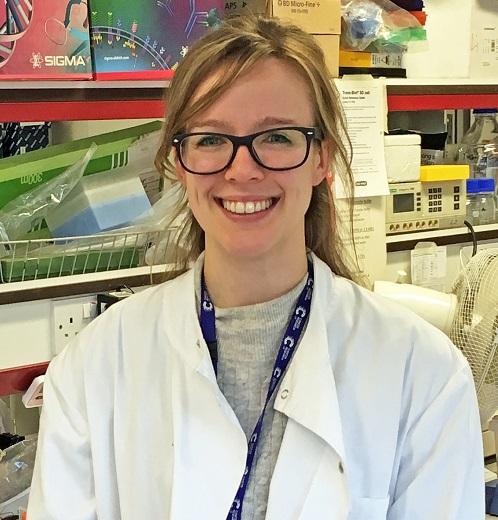Life as a Researcher- Emily Saunderson

I am a Postdoctoral Research Assistant in Dr Gabriella Ficz's laboratory group. Aside from the excellent reputation of the BCI, the Centre for Haemato-Oncology has strong links to the clinic through clinical senior lecturers, as well as lecturers and scientists with well-established backgrounds in basic science. This range of expertise is great because it’s always useful to get a different perspective on your research.
Current research
I am using the CRISPR/Cas9 system to investigate cellular transformation.
It’s a cliché, but everyone knows someone who has been affected by cancer. The project I’m working on is trying to understand what drives cellular transformation at the early stages of cancer development. Many studies show that mutations in the DNA sequence drive cellular transformation, but is a mutation always the initial event?
There is growing evidence that aberrant epigenetic mutations (or epimutations) may play a key role in driving cellular transformation, but until this point there has only been correlative data to support this. By using a novel form of CRISPR we are able to ask whether epigenetic changes can directly cause aberrant cellular function. I have a strong background in epigenetics so this is a particularly interesting area of research for me.
Life at the Institute
My days are very varied, so there isn’t really a typical day! But my time is mostly spent designing and performing lab experiments and analysing and discussing data with Dr Gabriella Ficz. Additionally there is the usual admin work, answering e-mails, ordering lab supplies etc. There are often seminars organised by the BCI to attend, as well as a weekly seminar in our Centre and a lab meeting or journal club, so there is lots of opportunity to discuss your work and share ideas.
Highlights
In the lab, the best thing has been expanding my technical skills in new areas. Outside of the lab, I’ve really enjoyed being exposed to a more clinical environment and learning about translation research. There are also great social events organised within Haem-Onc.
There are also many events organised for the BCI as a whole including monthly mixers as well as larger events during holiday periods so it’s not all about work!
Low points
It can be challenging moving to a new field of research as there is a lot of background work that you need to become familiar with. However, working in an institute that specialises in cancer research makes that transition a lot easier.
I wish I'd known...
The obvious advice is that you should choose a research area that you are interested in, whatever stage you are at in your career. But don’t be afraid to move to a new subject area, I am a biochemist, turned neuroscientist, turned cancer biologist! Let your interests direct your choices and your enthusiasm will speak for itself.
Finally, if you are interested in the work from a particular group it’s always worth contacting the PI speculatively, even if there is no advertised position at the time. It demonstrates that you are proactive and it makes you more memorable if you apply for a position in the future.
Future plans
I hope to be working in cancer research for the foreseeable future!
